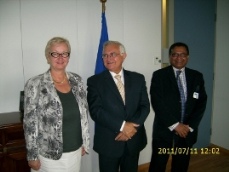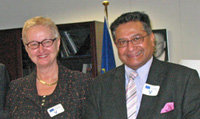Implementation of multi-sectoral guidance on third party violence in the workplace
Introduction
This document provides a summary report of the discussions at the three regional workshops held as part of the project on the Implementation of the multi-sectoral guidance on third party violence in the workplace, in London on 9th May, in Rome on 14th June and in and in in Prague on 6 September 2011.
Background of the project
On 16 July 2010, EPSU, UNIEuropa, ETUCE, HOSPEEM, CEMR, EFEE, EUROCOMMERCE, COESS, representing the social partners of the commerce, private security, local governments, education and hospital sectors have reached an agreement on multi-sectoral guidelines aimed to tackle third-party violence and harassment at work.
These Guidelines have been developed following two major conferences organised with the support of the Commission in March 2008 and October 2009 at which the outcomes of a research on third-party violence were presented along with case studies and joint conclusions . Therefore, these Guidelines build on these initiatives and complement the cross-sectoral Framework Agreement on Harassment and Violence at Work of 26 April 2007.
The organisation which were party to the multi-sectoral guidelines subsequently decided to disseminate the guidelines and obtained funding from the European Commission for a project to assist with the translation of the guidance into all EU languages, for three regional seminars and a final conference to be held with the goal making the guidelines more widely known, sharing good practices in tackling third party violence in the workplace and encouraging national member organisations to think about how the guidelines will be implemented in each Member State. GHK Consulting was commissioned to assist in the moderation of these events and in the preparation of reports.
The social partners from Central Government Administration (Trade Union’s National and European Delegation and European Public Administration Employers) added their signatures to the Multisectoral Guidelines on 17 December 2018, at the Liaison Forum in Brussels. Find the press release here
FULL TEXT: Summary report regional workshops | Multisectoral Guidelines Signed (guidelines also available in FR/DE/BG/CZ/DK/EE/EL/ES/FI/HU/IT/LT/NL/PL/PT/RO/RU/SK/SL)




Recent Comments